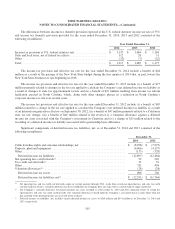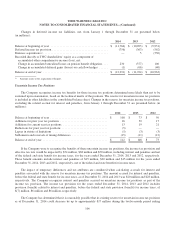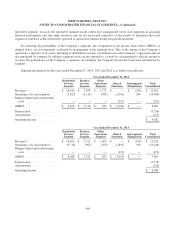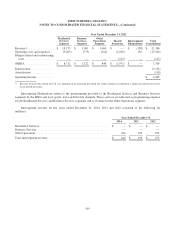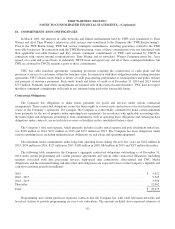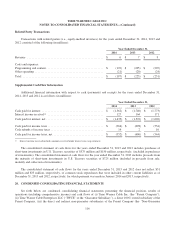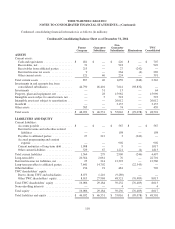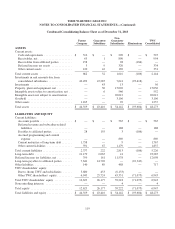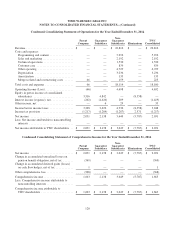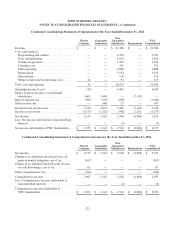Time Warner Cable 2014 Annual Report Download - page 121
Download and view the complete annual report
Please find page 121 of the 2014 Time Warner Cable annual report below. You can navigate through the pages in the report by either clicking on the pages listed below, or by using the keyword search tool below to find specific information within the annual report.TIME WARNER CABLE INC.
NOTES TO CONSOLIDATED FINANCIAL STATEMENTS—(Continued)
switched digital technology for video delivery, Multiprotocol Label Switching (“MPLS”) networks and data routing
techniques, Ethernet passive optical networks and IP Multimedia Subsystem (“IMS”) protocols to provide video, high-
speed data and voice services. Rockstar acquired these patents and others from Nortel Networks Limited, a wholly owned
subsidiary of Nortel Networks Corporation, in 2011. The plaintiff sought unspecified monetary damages. On January 3,
2014, the plaintiff filed an Amended Complaint, and on February 7, 2014, the Company moved to dismiss certain
allegations in the Amended Complaint. On September 29, 2014, the court denied the Company’s motion to dismiss. On
December 22, 2014, RPX Corporation, a patent risk management company, entered into an agreement with Rockstar and
several of its affiliates to purchase approximately 4,000 patents owned by Rockstar, including the patents at issue in this
litigation. Pursuant to the agreement, the Company received non-exclusive licenses to a portfolio of patents, including the
patents at issue in this litigation, on terms that are not material to the Company. On January 29, 2015, the U.S. District
Court for the Eastern District of Texas dismissed the lawsuit. The Company settled this lawsuit on terms that are not
material to the Company.
On December 19, 2011, Sprint Communications Company L.P. filed a complaint in the U.S. District Court for the
District of Kansas alleging that the Company infringes 12 patents purportedly relating to Voice over Internet Protocol
(“VoIP”) services. The plaintiff is seeking unspecified monetary damages as well as injunctive relief. The Company
intends to defend against this lawsuit vigorously, but is unable to predict the outcome of this lawsuit or reasonably
estimate a range of possible loss.
The Company is the defendant in In re: Set-Top Cable Television Box Antitrust Litigation, ten purported class actions
filed in federal district courts throughout the U.S. These actions are subject to a Multidistrict Litigation (“MDL”) Order
transferring the cases for pretrial proceedings to the U.S. District Court for the Southern District of New York. On July 26,
2010, the plaintiffs filed a third amended consolidated class action complaint (the “Third Amended Complaint”), alleging
that the Company violated Section 1 of the Sherman Antitrust Act, various state antitrust laws and state unfair/deceptive
trade practices statutes by tying the sales of premium cable television services to the leasing of set-top converter boxes.
The plaintiffs are seeking, among other things, unspecified treble monetary damages and an injunction to cease such
alleged practices. On September 30, 2010, the Company filed a motion to dismiss the Third Amended Complaint, which
the court granted on April 8, 2011. On June 17, 2011, the plaintiffs appealed this decision to the U.S. Court of Appeals for
the Second Circuit. The Company intends to defend against this lawsuit vigorously, but is unable to predict the outcome
of this lawsuit or reasonably estimate a range of possible loss.
On August 9, 2010, the plaintiffs in Michelle Downs and Laurie Jarrett, et al. v. Insight Communications Company,
L.P. filed a second amended complaint in a purported class action in the U.S. District Court for the Western District of
Kentucky alleging that Insight Communications Company, L.P. violated Section 1 of the Sherman Antitrust Act by tying
the sales of premium cable television services to the leasing of set-top converter boxes, which is similar to the federal
claim against the Company in In re: Set-Top Cable Television Box Antitrust Litigation, discussed above. The plaintiffs
were seeking, among other things, unspecified treble monetary damages and an injunction to cease such alleged practices.
On July 19, 2013, TWC filed a motion for summary judgment, which argued that Insight Communications Company, L.P.
did not coerce the plaintiffs to lease a set-top converter box, a necessary element of the plaintiffs’ claim. On July 29, 2014,
the court granted TWC’s summary judgment motion and entered judgment in TWC’s favor. On August 26, 2014, the
plaintiffs filed a motion for reconsideration, which was denied on December 1, 2014. The plaintiffs did not appeal the
grant of summary judgment, terminating the litigation.
From time to time, the Company receives notices from third parties and, in some cases, is party to litigation alleging
that certain of the Company’s services or technologies infringe the intellectual property rights of others. Claims of
intellectual property infringement could require TWC to enter into royalty or licensing agreements on unfavorable terms,
incur substantial monetary liability or be enjoined preliminarily or permanently from further use of the intellectual
property in question. In addition, certain agreements entered into by the Company may require it to indemnify the other
party for certain third-party intellectual property infringement claims, which could increase the Company’s damages and
113




